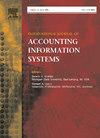揭示云ERP的竞争辩证法,支撑会计和信息系统专业人员的逻辑和角色
IF 6
3区 管理学
Q2 BUSINESS
International Journal of Accounting Information Systems
Pub Date : 2025-01-21
DOI:10.1016/j.accinf.2025.100728
引用次数: 0
摘要
本研究深入探讨了云erp在组织中的辩证含义,强调了会计师和信息系统(IS)专业人员在各种组织规模中的作用。采用制度逻辑的观点,它探讨了多样性,争论和机制,阐明了云- erp的混合性质及其对组织和会计师和信息系统专业人员的参与的影响。该研究采用半结构化访谈、观察和组织档案。通过NVivo Plus进行数据分析,确定了相关组织中的基本辩证法和各种制度逻辑的突出性,并动员不同的专业人员和机制来有效地管理这些影响。我们确定了两种主要的竞争逻辑——业务和技术——体现在云erp中,由三对相互作用的辩证法实例化:节约与透明度,可访问性与限制,效率与错位。这些辩证法的重要性因组织规模的不同而不同:大型组织的透明度,中型企业的可及性,以及小型企业的不一致性。这种动态的相互作用受到会计师和信息系统专业人员角色的影响,强调了对特定于具体情况的协作机制的需求,这种机制在大型组织中是实用的,在中型企业中是基于信任的,在小型企业中是务实的,以便有效地管理这些相互竞争的逻辑。研究结果具有理论和实践意义,提供了对云- erp的辩证法、张力和复杂决策景观的见解。本文章由计算机程序翻译,如有差异,请以英文原文为准。
Unveiling the rivalry of cloud ERP dialectics, underpinning logics and roles of accounting and information system professionals
This study delves into the dialectical implications of Cloud-ERP within organisations, emphasising the roles of accountants and information systems (IS) professionals across various organisational sizes. Adopting an institutional logic perspective, it explores the multiplicity, contestation, and mechanisms that elucidate the hybridity nature of Cloud-ERP and its impact on organisations and the involvement of accountants and IS professionals. The study employs semi-structured interviews, observations and organisational archives. Data analysis was conducted through NVivo Plus, identifying fundamental dialectics and the prominence of various institutional logics within implicated organisations and mobilising different professionals and mechanisms to manage these implications effectively. We identified two primary competing logics—business and technical—manifesting in Cloud-ERP instantiated by three pairs of interactable dialectics: economisation vs transparency, accessibility vs restriction, and efficiency vs misalignment. The importance of these dialectics varies across organisational sizes: transparency in large organisations, accessibility in medium-sized enterprises, and misalignment in small enterprises. This dynamic interplay, influenced by the roles of accountants and IS professionals, highlights the need for context-specific collaborative mechanisms, practical in large organisations, trust-based in medium enterprises, and pragmatic in small enterprises, to manage these competing logics effectively. The findings have implications for theory and practice, providing insights into the dialectics, tension, and complex decision-making landscape of Cloud-ERP.
求助全文
通过发布文献求助,成功后即可免费获取论文全文。
去求助
来源期刊
CiteScore
9.00
自引率
6.50%
发文量
23
期刊介绍:
The International Journal of Accounting Information Systems will publish thoughtful, well developed articles that examine the rapidly evolving relationship between accounting and information technology. Articles may range from empirical to analytical, from practice-based to the development of new techniques, but must be related to problems facing the integration of accounting and information technology. The journal will address (but will not limit itself to) the following specific issues: control and auditability of information systems; management of information technology; artificial intelligence research in accounting; development issues in accounting and information systems; human factors issues related to information technology; development of theories related to information technology; methodological issues in information technology research; information systems validation; human–computer interaction research in accounting information systems. The journal welcomes and encourages articles from both practitioners and academicians.

 求助内容:
求助内容: 应助结果提醒方式:
应助结果提醒方式:


